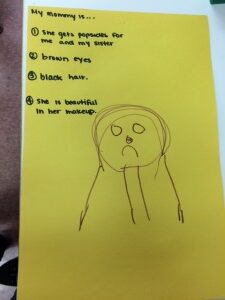I often get parents who are having a hard time understanding something related to their children who email me asking if I can help. I had a mom write to me a while back and ask what she should do about the picture that her daughter gave to her.
Email from a Mom
Here is what “Sandy” wrote:
I have three children, my second child is 4 years old. She was asked at her preschool to draw a picture of mommy and write something about her. She drew me with a sad face and wrote a couple nice things about me. When I asked her why do I have a sad face she said “because you miss me when I am at school”. I almost cried when I saw the drawing, I asked the teacher she told me not to over think it and that it is nothing serious. I honestly can not sleep over it I am worried something is wrong with my child. I am a stay at home mom and my entire life is dedicated for those kids. I know I am not perfect and have my flaws as a mom just like all of the moms out there but I try to be. Please advise.
See the picture below:

My Response
My Recommendations
“So, you may want to make it a point (at a neutral and laid back time) to talk about how happy you are that she loves her school or that you love that she goes to school and learns so much. This will allow her to associate a positive thing with her going to school. This will also help her to realize that you are very glad that she has the chance to got to school each day, even though you may miss her.”
Broad Application
Sometimes it is difficult to understand why a child thinks or believes something. Especially when we feel responsible for their negative associations or that we did something to create them. Our emotions can cloud our ability to objectively look at the scenario and get to the “why” in the message.
One of the techniques for this is “other orientation.” You want to put yourself in your child’s shoes, and look at things neutrally from their perspective. If your child communicates that she thinks that you miss her at school and she is four, she had to have learned that message from somewhere. If you never communicated that to her, someone at school is the most likely messenger.
Further, it is helpful to take your feelings and emotions about the situation and set them aside to fully relate to the “why” behind a message. It can be challenging to realize that your child does not have the ability to reason and draw conclusions like we do, so we often place our own pressures and guilt on scenarios that do not exist for them.
Finally, sometimes the most effective solution to decoding children’s messages might be to run the situation by a friend or trusted mentor to offer a more objective perspective. When it is our own kids, we can struggle to see the bigger picture that someone else can easily present. Sandy did just that by sending it to me, and giving me permission to share it with you to help you not worry unnecessarily about what our kids are trying to say to us when it doesn’t seem to be clear why.

